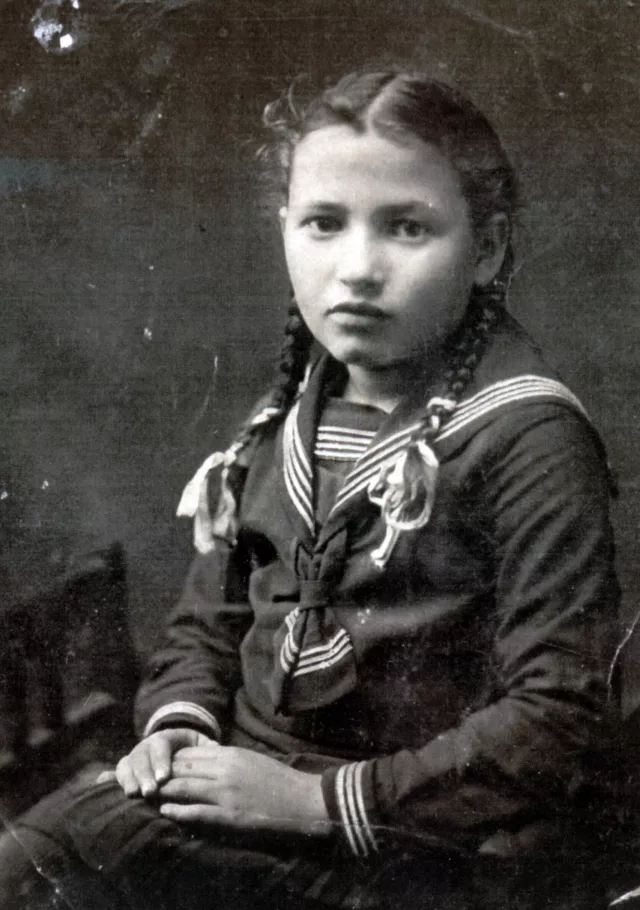Irina Doroshkova
I, Irina Mazor, on my 10th birthday photographed in Berdichev in 1940.
In 1937 when I turned 7 I went to a Russian school near our house in the center of the town. I remember an event at school when I was in the first form. We had portraits of Yakir, Kossior and other military commanders and Party activists. Once our teacher told us that they were 'enemies of the people' and we painted them over with ink.
I became a pioneer when I was in the 3rd form (1940). At the ceremony we were told that we had become Young Leninists and offered to learn a poem. I learned the poem 'Five days and nights' in which the country was grieving for the loss of Lenin. I remember some lines '…And crowds of people were flowing carrying flags to look at the yellow profile and a red order on his chest. They were flowing. And the earth was freezing as if he had taken with him some of the warmth…' and at this I burst into tears and felt very ashamed about it. These were tears of grief and despair, but I was ashamed to be crying in front of the audience not being able to pull myself together and finish reciting the poem that came right from my heart. Then our pioneer leader came to tie our neckties and show us how to salute. It was a very festive ceremony.
We rarely had guests. The only birthday celebrated in the family was mine. I had to invite every attendee saying 'You are invited for a cup of tea on my birthday'. Those were not my friends that were invited, but my mother's colleagues and their children. We had tea, cakes and candy. There was also music on a wireless with a handle. We had a stove in one room, a sofa where my nanny slept, a table where we had meals and a cupboard. In another room there was my parents' nickel-plated bed and my bed, a radio - a big black plate, a big mirror on the wall and a big rubber plant.
We had ordinary food - I don't remember any specialties: clear soup, borsch, cutlets, potatoes and macaroni. This was all Marusya could cook. My mother could make stuffed chicken that Marusya couldn't do, but my mother made it rarely. We had a good life and my father was happy about it. He had an office at school since he was deputy director. He took me once to look at his office.
I had finished the 4th form successfully when my mother told me about the beginning of the great Patriotic War on 22 June 1941, announced on our black plate radio in our room. But the previous morning I was woken by a roar over my head. My mother said 'Go back to sleep - it is just another military training'. But no - those were German planes flying in the direction of Zhytomir and Kiev. In a day my mother ran home from work and told my father that Party dignitaries and their families were leaving the tom the following night, but my mother wasn't on that list. My parents packed a suitcase, grabbed me by my hand and we ran to the center of the town where my mother's friend Bertha lived. She worked at the Party town committee and was on the list. My mother managed to obtain a permit to Frolov town near Stalingrad. We got accommodation in an apartment of a Kazakh woman. Her daughter slept with us in the room. My mother got a job of director of stationary store. We stayed less than half a year with the Kazakh woman before we had to move on since the front was coming closer. We didn't face any anti-Semitism. I had friends among my classmates - only our family had to leave. My mother wrote her brother David in Cheliabinsk region and he replied that we could come to join him there.
We arrived at a small provincial town of Emanzhelinsk in the Ural, in 2500 km from Berdichev. David lived in a barrack where we got a room and a kitchen. There was a big Russian stove in the kitchen and we, children, used to sit and play there. I heard the word zhydovka for the first time in the Ural. Children called me this name when I was going home from school. I asked my mother what it meant, but she seemed to be reluctant to explain to me what it meant. She went to talk to parents of these children, but this didn't change much. I don't know whom these children got this name from. There were no Jews in this area whatsoever. Other girls and I played with dolls together- we wrapped some grass into a cloth, painted eyes and mouths and made them clothes from leftovers of fabrics. I mean to say that nobody ever paid any attention to my nationality. Only I knew that I was different and I felt like being no different.
I went to the school. People treated us very nicely. I was a success with my studies and helped my classmates. I remember my classmates getting together in the house of one of our classmates Shurik. His mother used to tell us fairy tales and there was a kindling burning in the room. We had a big map of our country on the wall in our room at home and we always marked which towns were liberated from fascists. I was fond of reading and read a lot. I mostly read Russian and foreign classic literature.











